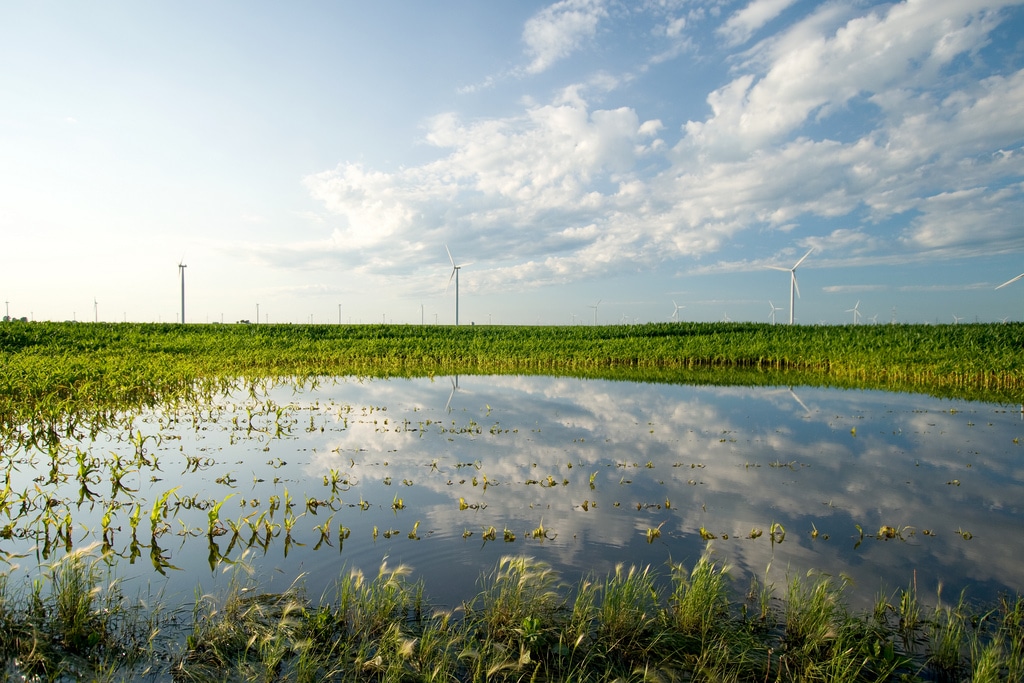Following the Cassington AD plant lightning strike incident last October, ADBA has issued guidance notes…
Stepping Up: Safe and equitable access to food, water and energy systems.

Pools of Water Reflect: Ben Husmann
Flickr link to image: Pools of Water Reflect
License: CC-BY 2.0
Safe and equitable access to food, water and energy systems, and the goods and services they provide, underpin our societal and global wellbeing. However, they are all stressed due to unsustainable production and consumption processes. Although each system tends to be regulated in isolation, it is ever more important that they are effectively regulated as a whole. If this does not happen, policy brought in to benefit one may have an unintended negative consequence in the others. For example, hydropower dam water release may be governed by the demands of electricity production, but with little consideration for the effect it might have on irrigated crops further downstream. The concept of this Water, Energy, Food (WEF) Nexus is becoming an important area of research in exploring and understanding how all three might be managed as a whole.
The research project Stepping Up is looking at niche innovations that have the potential to improve the sustainability of the provision of a good or service. While such innovations might improve the sustainability of production and consumption in a particular area, their impact in the wider context of the WEF nexus is not well understood. Stepping Up is thus looking to improve our understanding of both positive and negative impacts of scaling up innovations across all of the nexus dimensions.
We are engaging with stakeholders throughout the project and are developing case studies of innovations across a range of scales. By speaking to actors relevant to the innovation process (practitioners, intermediaries, policymakers, regulators, civil society, trade bodies) we hope to develop insights into the drivers, motivations, enablers, and constraints experienced by specific innovations.
The innovations selected for study are anaerobic digestion (AD), insects for protein and the technical and social recovery of value from surplus food. An example of technical recovery might be extraction of protein from potato processing off-cuts which can be extracted for use in animal feed or as an additive to food. An example of social recovery is the work done by charity FareShare. These innovations represent a diversity of different perspectives and modes of operation: from profit making, to charity; from single product focused, to business diversification; from utilisation of waste to prevention of waste; from technical to social; from local to national scale etc.
The discussions will lead to an understanding of both the requirements for innovation fostering and growth, and the limits by identifying the ‘rules’ that govern the behaviour of different actors. For example in the case of farmers installing AD, such rules might include their responses to costs and expectations of revenues, the experiences of peers, attitudes to risk etc. These rules will be used to create an Agent Based Model to investigate the potential for the innovations to grow or spread to become mainstream. Such models are particularly useful in drawing to light how the aggregated behaviours of different actors (such as individuals, businesses, institutions) shape complex system as a whole.
We will use the models to investigate what the effects on the WEF system in the UK might be if those innovations are scaled up. We will also be giving particular focus to the effects the innovations may have on the reduction of emissions of non-CO2 greenhouse gases, which might be particularly associated with land use and agriculture. The model will also be used to investigate how those innovations may fare in a world subject to climate change: what happens under 2°C or 4°C warming? How is food and water availability affected by both the climate change and our demands on the system?
A further outcome of the project is the development of a decision support tool. This will be freely available for policy makers, decision makers in business or government, or those who wish to grow their own innovations in order to inform them of the wider implications of up scaling innovations in a WEF Nexus context.
Engaging with case studies and stakeholders throughout the project will help ensure that the research is robust, relevant and impactful and we would of course welcome any input from interested parties. If you wish to contact us, either James Suckling (j.suckling@surrey.ac.uk) or Iain Soutar (I.Soutar@exeter.ac.uk) will be very happy to hear from you.
The project is funded by the Engineering and Physical Sciences Research Council (EPSRC) and is running from October 2015 until September 2018. It is a multi-partner project led by Prof. Alice Larkin of Manchester University. Other partners include the Universities of Surrey, Exeter, Glasgow, Cranfield, Abertay and Loughborough and HR Wallingford.
James and Iain will be delivering a workshop at ADBA's Research and Innovation Forum on the 29th March. To find out more and to book your ticket, click here.



